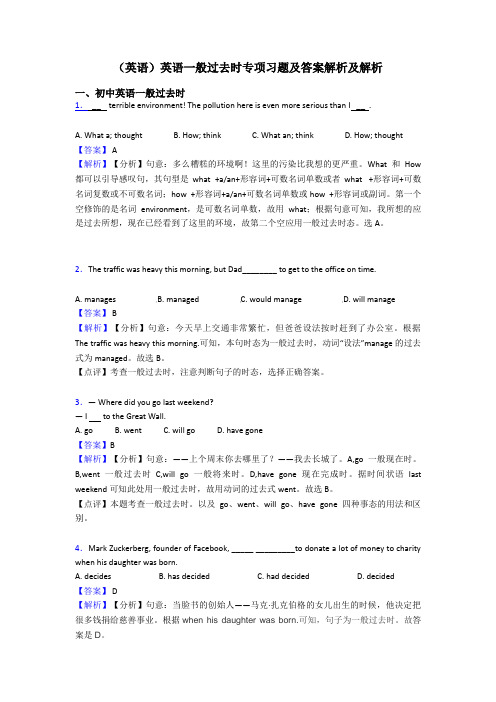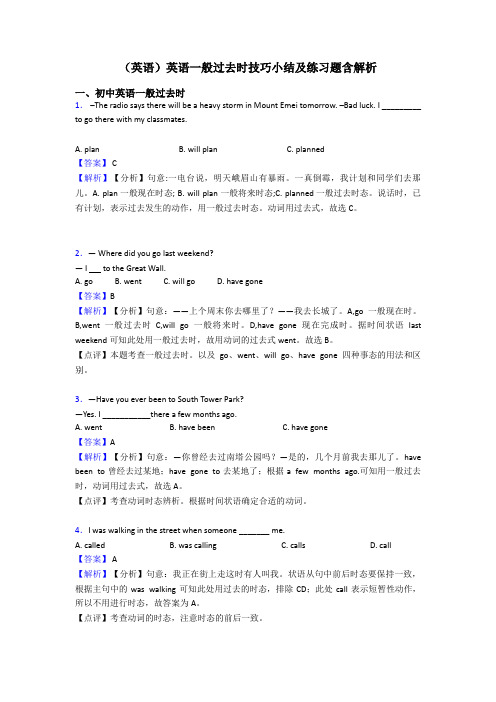初中一般过去时含习题解析
(英语)英语一般过去时常见题型及答题技巧及练习题(含答案)含解析

(英语)英语一般过去时常见题型及答题技巧及练习题(含答案)含解析一、初中英语一般过去时1.Mr Zhang and his wife _______to the party last Sunday。
()A. invitedB. was invitedC. were invited【答案】 C【解析】【分析】句意:上周星期天请的张先生和妻子参加晚会。
表示上周星期天发生的过去动作,用一般过去时态;主语Mr Zhang and his wife是谓语动词invite的承受者,用被动语态,主语Mr Zhang and his wife表示复数合义。
故选C。
2.The traffic was heavy this morning, but Dad________ to get to the office on time.A. managesB. managedC. would manageD. will manage【答案】 B【解析】【分析】句意:今天早上交通非常繁忙,但爸爸设法按时赶到了办公室。
根据The traffic was heavy this morning.可知,本句时态为一般过去时,动词“设法”manage的过去式为managed。
故选B。
【点评】考查一般过去时,注意判断句子的时态,选择正确答案。
3.I was walking in the street when someone _______ me.A. calledB. was callingC. callsD. call【答案】 A【解析】【分析】句意:我正在街上走这时有人叫我。
状语从句中前后时态要保持一致,根据主句中的was walking可知此处用过去的时态,排除CD;此处call表示短暂性动作,所以不用进行时态,故答案为A。
【点评】考查动词的时态,注意时态的前后一致。
4.-Have you ever been to Xiamen?-Yes. I _ there in 2013.A. goB. wentC. have gone【答案】 B【解析】【分析】句意:一你去过厦门吗?一是的,我2013年去的。
(英语)英语一般过去时技巧(很有用)及练习题及解析

(英语)英语一般过去时技巧(很有用)及练习题及解析一、初中英语一般过去时1.—_____ you _____ your homework yet?—Yes, I _____ it ten minutes ago.A. Did; do; finishedB. Have; done; have finishedC. Have; done; finishedD. Will; do; finish【答案】 C【解析】【分析】句意:---你完成作业了吗?---是的,我十分钟前完成了。
yet是现在完成时的标志,所以第一句用现在完成时;ago是一般过去时的标志,所以第二空用过去式,故答案为C。
【点评】考查动词的时态,理解句意,根据关键词yet和ago判断时态。
2.—Do you know who invented lights?—Yes, they by Edison.A. inventedB. are inventedC. were inventedD. was invented【答案】 C【解析】【分析】句意:——你知道谁发明了电灯吗?——是的,它们是被爱迪生发明的。
A. invented发明,一般过去时态;B. are invented被邀请;一般现在时态的被动语态;C. were invented被邀请,一般过去时态的被动语态;D. was invented被邀请,一般过去时态的被动语态,单数。
电灯的发明已成为过去,这里是一般过去时态的被动语态,主语是复数,这里用were done的形式。
根据句意,故答案为C。
【点评】考查被动语态。
注意一般过去时态被动语态的构成。
3.—Sorry, I your dictionary yesterday.—It doesn't matter.A. took; by handB. took; by mistakeC. got; by accidentD. brought; in this way【答案】 B【解析】【分析】句意:——抱歉,昨天我由于差错拿走了你的字典。
(英语)英语一般过去时练习题20篇及解析

(英语)英语一般过去时练习题20篇及解析一、初中英语一般过去时1.-Have you finished your homework?-Yes, I have. I it this morning.A. finishB. finishesC. finishedD. have finished【答案】C【解析】【分析】句意:你完成你的作业了吗?——是的,我完成了。
我今天早晨完成的。
结合语境可知下文描述的是过去某时发生的动作,故用一般过去时态。
选C。
【点评】英语中的时态主要是借助于时间状语与上下文语境来进行判断。
解答此类题型,首先要注意句子中的时间状语,如果没有则要通过分析上下文,结合语境来判断句子的时态。
英语疑问句中一般具有时态上的对应关系,注意结合这一特点进行区分。
2.—Linda is not coming for the party tonight.—But she _.A. promisesB. promisedC. will promiseD. had promised【答案】 B【解析】【分析】句意:——琳达今晚不会来聚会。
——但是她答应了啊。
根据前一句可知“她答应”发生在说话之前,故用一般过去时,因此选B。
【点评】考查动词的时态。
3.Everyone except Tom and John there when the meeting began.A. areB. isC. wereD. was【答案】 D【解析】【分析】句意:当会议开始的时候,除了Tom和John没来,每个人都在这。
except和besides两者都是“除去”之意,但前者指“但并不包括”,是“排除”之意,后者指“除此之外还有”,是“外加”之意。
举例如下:There are six of us besides Tom.除汤姆外,另外还有6人。
(一共7人)We all went home except Tom.除汤姆外,我们全回家了。
(英语)英语一般过去时及其解题技巧及练习题(含答案)及解析

(英语)英语一般过去时及其解题技巧及练习题(含答案)及解析一、初中英语一般过去时1.As we all know, the Silk Road _______ China to the west in ancient times.A. connectsB. connectedC. will connectD. is connecting【答案】B【解析】【分析】句意:众所周知,在古代丝绸之路是连接中国和西方的。
In ancient times“在古代”,因此要用一般过去式。
结合句意,故选B。
【点评】考查动词时态。
2.Everyone except Tom and John there when the meeting began.A. areB. isC. wereD. was【答案】 D【解析】【分析】句意:当会议开始的时候,除了Tom和John没来,每个人都在这。
except和besides两者都是“除去”之意,但前者指“但并不包括”,是“排除”之意,后者指“除此之外还有”,是“外加”之意。
举例如下:There are six of us besides Tom.除汤姆外,另外还有6人。
(一共7人)We all went home except Tom.除汤姆外,我们全回家了。
(只有汤姆一人未回家)。
谓语动词要看except前面的主语。
故选D。
【点评】本题考查be动词。
以及are、is、were、was四个词的用法和区别。
3.—Have you ever been to South Tower Park?—Yes. I ___________there a few months ago.A. wentB. have beenC. have gone【答案】A【解析】【分析】句意:—你曾经去过南塔公园吗?—是的,几个月前我去那儿了。
have been to曾经去过某地;have gone to去某地了;根据a few months ago.可知用一般过去时,动词用过去式,故选A。
(英语)英语一般过去时专项习题及答案解析及解析

(英语)英语一般过去时专项习题及答案解析及解析一、初中英语一般过去时1. __ terrible environment! The pollution here is even more serious than I __ .A. What a; thoughtB. How; thinkC. What an; thinkD. How; thought【答案】 A【解析】【分析】句意:多么糟糕的环境啊!这里的污染比我想的更严重。
What 和How 都可以引导感叹句,其句型是what +a/an+形容词+可数名词单数或者what +形容词+可数名词复数或不可数名词;how +形容词+a/an+可数名词单数或how +形容词或副词。
第一个空修饰的是名词environment,是可数名词单数,故用what;根据句意可知,我所想的应是过去所想,现在已经看到了这里的环境,故第二个空应用一般过去时态。
选A。
2.The traffic was heavy this morning, but Dad________ to get to the office on time.A. managesB. managedC. would manageD. will manage【答案】 B【解析】【分析】句意:今天早上交通非常繁忙,但爸爸设法按时赶到了办公室。
根据The traffic was heavy this morning.可知,本句时态为一般过去时,动词“设法”manage的过去式为managed。
故选B。
【点评】考查一般过去时,注意判断句子的时态,选择正确答案。
3.— Where did you go last weekend?— I to the Great Wall.A. goB. wentC. will goD. have gone【答案】B【解析】【分析】句意:——上个周末你去哪里了?——我去长城了。
(英语)英语一般过去时技巧小结及练习题含解析

(英语)英语一般过去时技巧小结及练习题含解析一、初中英语一般过去时1.–The radio says there will be a heavy storm in Mount Emei tomorrow. –Bad luck. I _________ to go there with my classmates.A. planB. will planC. planned【答案】 C【解析】【分析】句意:一电台说,明天峨眉山有暴雨。
一真倒霉,我计划和同学们去那儿。
A. plan一般现在时态; B. will plan 一般将来时态;C. planned一般过去时态。
说话时,已有计划,表示过去发生的动作,用一般过去时态。
动词用过去式,故选C。
2.— Where did you go last weekend?— I to the Great Wall.A. goB. wentC. will goD. have gone【答案】B【解析】【分析】句意:——上个周末你去哪里了?——我去长城了。
A,go一般现在时。
B,went一般过去时C,will go一般将来时。
D,have gone现在完成时。
据时间状语last weekend可知此处用一般过去时,故用动词的过去式went。
故选B。
【点评】本题考查一般过去时。
以及go、went、will go、have gone四种事态的用法和区别。
3.—Have you ever been to South Tower Park?—Yes. I ___________there a few months ago.A. wentB. have beenC. have gone【答案】A【解析】【分析】句意:—你曾经去过南塔公园吗?—是的,几个月前我去那儿了。
have been to曾经去过某地;have gone to去某地了;根据a few months ago.可知用一般过去时,动词用过去式,故选A。
英语英语一般过去时练习题及答案及解析

(英语)英语一般过去时练习题及答案及解析一、初中英语一般过去时1.- Have you finished your homework?-Yes, I have. I it this morning.A. finishB. finishesC. finishedD. have finished【答案】 C【解析】【解析】句意:你完成你的作业了吗?——是的,我完成了。
我今日清晨完成的。
联合语境可知下文描述的是过去某时发生的动作,故用一般过去时态。
选 C。
【谈论】英语中的时态主假如借助于时间状语与上下文语境来进行判断。
解答此类题型,第一要注意句子中的时间状语,假如没有则要经过解析上下文,联合语境来判断句子的时态。
英语疑问句中一般拥有时态上的对应关系,注意联合这一特色进行划分。
2.—My car ________ yesterday. Could you please give me a ride tomorrow?—I'm sorry I can't, I'm ________ Dalian tomorrow morning.A. breaks down; flying atB. has broken down; flying atC. broke down; flying toD. had broken down; flying to【答案】C【解析】【解析】句意:——我的车坏了,你明日能搭我一程吗?——对不起我不可以,我明日清晨要坐飞机去大连。
break down ,出弊端,出故障,依据yesterday,可知用一般过去时, break 的过去式是 broke,依据 tomorrow morning ,可知用一般未来时,一些表示挪动的动词可以用 be+doing ,表未来时,应选 C。
【谈论】观察动词的时态。
注意依据时间状语确立动词时态。
3.Everyone except Tom and John A. are B. is there when the meeting began.C. wereD. was【答案】D【解析】【解析】句意:当会议开始的时候,除了Tom 和 John 没来,每一个人都在这。
(英语)英语一般过去时技巧阅读训练策略及练习题(含答案)及解析

(英语)英语一般过去时技巧阅读训练策略及练习题(含答案)及解析一、初中英语一般过去时1.—There is someone knocking at the door.—It must be the computer repairman. I him to come to fix my computer.A. callB. have calledC. calledD. will call【答案】C【解析】【分析】句意:——有人在敲门。
——一定是电脑维修人员。
我给他打电话来修理我的电脑。
因此先打电话,然后维修人员来修理他,故此处用一般过去时,故此处为called,故选C。
【点评】本题考查时态辨析。
以及call;have called;called;will call四种时态的用法和区别。
2.—Linda is not coming for the party tonight.—But she _.A. promisesB. promisedC. will promiseD. had promised【答案】 B【解析】【分析】句意:——琳达今晚不会来聚会。
——但是她答应了啊。
根据前一句可知“她答应”发生在说话之前,故用一般过去时,因此选B。
【点评】考查动词的时态。
3.In February, Chinese tech company Huawei ________ Mate X, a foldable (可折叠的) 5G mobile phone.A. is introducingB. introducedC. introducesD. was introduced【答案】 B【解析】【分析】句意:二月,中国科技公司华为介绍Mate X,一款可折叠5G手机。
根据In February,可知陈述过去的事情,用一般过去时,谓语动词用过去式,introduce介绍,其过去式是introduced,故选B。
- 1、下载文档前请自行甄别文档内容的完整性,平台不提供额外的编辑、内容补充、找答案等附加服务。
- 2、"仅部分预览"的文档,不可在线预览部分如存在完整性等问题,可反馈申请退款(可完整预览的文档不适用该条件!)。
- 3、如文档侵犯您的权益,请联系客服反馈,我们会尽快为您处理(人工客服工作时间:9:00-18:30)。
主语+动词的过去式+表示过去的时间状语
所有时态都是通过
动词
变化来表现的
• He was young in 1980. He is old now.
is的过去式是 was
then
Yi Jianlian
• 9.There _w_e_re__ five boys in the class at first, but now there __is___ one boy .
• 10.The cat _w__as__ in the house. Now it _is___ in the tree.
小结
3.一般疑问句 Was/Were+主语+其他?
A__m__ _I_ b__u__s_y__?_ (一般现在时)
Was I busy? (一般过去时)
例句
• Was she there?她过去在那里吗? • W句:I was at home last night.
个句子了,这是最简单的
造一个一般过去时的句子 的方法。
be动词的一般过去时的结构 be动词的一般过去时的例题
小结be动词的一般过去时
1.肯定句 主语+be动词过去式+其他
_I_ a__m__ b__u_s__y (一般现在时)
I was busy (一般过去时)
例句
• She was there.她过去在那里。 • We were there.我们曾在那里。 • You were a worker.你曾经是个工人。
be动词的一般过去时的用法
am , is ——过去式 was
否定式 was not / wasn’t
are 过去式 were
否定式 were not /weren’t
be动词的一般过去时的结构
1. 肯定句:主语+谓语动词的过去式+其他
2. 否定句:主语+was/were+not+其他
3. 一般疑问句:Was/Were+主语+其他?
weren’t 一般疑问句:Were you at home last night? 答语:Yes, we were. / No, we weren’t.
例题:
1. They __w_e_r_e_ in Beijing in 1960. 2. I _w__a_s_ ill yesterday. 3. My sister__w_a_sat home yesterday evening.
be动词的一般过去时
原形 am is
are
过去时 was was were
他们今天在中国。 They _a_r_e_ in China today.
他们昨天在日本。 They _w_e_re_ in Japan yesterday.
am/ is are
was were
其实was和were的用法很 容易理解,要把be动词换 成过去形式就可以组成一
now
Yao MYiinJgianlian
He was a little fat . Now he is strong .
He was short .
Now he is tall .
Liu Xiang
short
Then he was short .
Liu Xiang
tall
Now he is tall .
一般过去时态
什么是一般过去时?
动词的一般过去时态表示过去发生的 动作、情况或存在的状态。
行为动词(即实义动词)的过去式没有人称 和数的变化。
The things happened in the past.
The Simple Past Tense
past
now
future
It is sunny today. I come to school.
4. Where _w__e_r_e_ you born? 5. They _w__e_r_e_ naughty when they were six years
old..
6. She __w_a_s__ angry then.
7. Kate____w_baosrn in England.
8. _W__a_s__ she a teacher last year?
be动词的过去式有四巧
时间状语巧 :表示过去的短语要记牢;
形式巧 :单数was,复数were;
否定句结构巧 :
not紧跟was / were;
疑问句式巧 :
was / were向前跑(提前)。
23
改为否定句
• 1.He was ten years old last year. • He wasn’t ten years old last year. • 2. There were many students in the
注意
• 单数用was,复数用were.
2.否定句 主语+was/were+not+其他
_I_ a__m___n_o__t_ b__u_s__y.(一般现在时)
I wasn’t busy.(一般过去时)
例句
• He wasn’t a farmer. 他过去并不是农民。 • We weren’t there. 那时我们不在那里。
Please look at the sentences
我今年12岁. I _a_m_ 12 years old this year.
我去年11岁. I _w_a_s_ 11 years old last year.
他现在在北京。 He __is__ in Beijing now. 他昨天在上海。 He _w_a_s_ in Shanghai yesterday.
否定句:I was not at home last night.
wasn’t 一般疑问句:Were you at home last night? 答语:Yes, I was. / No, I wasn’t.
肯定句:We were at home last night.
否定句:We were not at home last night.
school. • There weren’t any students in the
school. • 3.She was very short. • She wasn’t very short.
